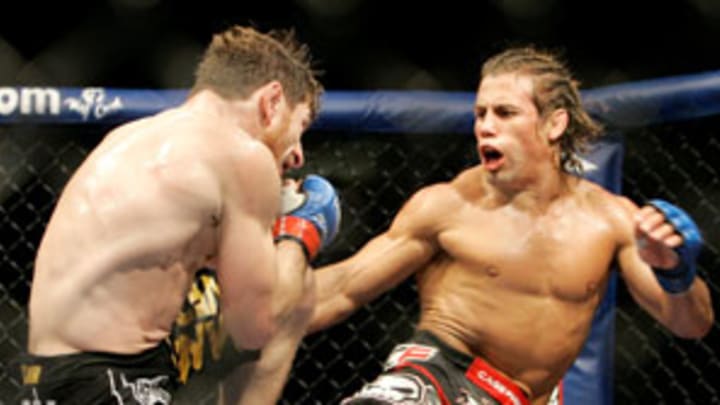MMA's power brokers need to turn attention back to fighters

If you don't think 2010 will be wildly important for mixed martial arts, you're not paying attention.
As the sport continues on its path out of the wilderness -- it won't be completely clear until the thing is regulated throughout the United States, especially New York -- the new year of a new decade appears poised to shape MMA in a way that would determine the sport's relevance generations from now.
Though it may not seem so on the surface -- what with UFC breaking pay-per-view records, exposure of the sport on network television, rising fighter purses, an ever-growing fan base and increasing media coverage -- MMA remains very much in flux. UFC president Dana White may have prophesied that his company will drive MMA to become the biggest sport in the world by 2020, but there aren't any guarantees its rise will continue at all, let alone at the rate it has since 2005.
Serious issues remain unresolved, and new ones will surely arise. Concerns of oversaturation on American television will be met head on in 2010. The impact of collective bargaining for fighters could begin to play out in a real way. A dire need for competent regulation and judging is underscored each time fighters step in the cage. Expansion of MMA internationally will certainly be a story in the coming year (especially with the UFC planning a major push into Asian markets and governments like China poised to embrace the sport). And on the home front, a promotional war between the UFC and Strikeforce is likely to intensify.
Each is important, and each could dominate headlines throughout the next few years. Yet, as vital as these issues are to the continued growth of MMA, for the sport to live up to its potential, it must trump entertainment.
Between Spike TV, HDNet, Showtime, Versus, CBS, Fox Sports and pay-per-view, MMA fans will have the ability to watch more than 100 live fight cards in 2010. I've often wondered about the point of it all if the game isn't rooted in seeing the very best fight the very best. How much longer will mixed martial arts remain palatable to Americans if the premise is skewed more toward watching a good fight, rather than determining who's No. 1?
The way the sport is structured, with UFC running as its own independent "league" -- though that's hardly the word for it -- too many important fights are in jeopardy of not getting made. Plenty do, of course. But we've already seen several major matchups get tossed aside, such as FedorEmelianenko vs. Randy Couture, and, down the road, perhaps B.J. Penn against Shinya Aoki. There's little reason to believe that won't be a trend.
When Zuffa purchased the UFC for $2 million in 2001, few could have imagined 10 percent would be worth an estimated $100-150 million 10 years later. It's a testament to the ambitiousness of rich businessmen. In the beginning, White and Lorenzo Fertitta spoke of ensuring that the best fights were made, and spoke highly of the idea of co-promotion. Not anymore. Now they consider the idea counter to everything they hope to accomplish.
Where has it led us? An increasing pattern of championship fights with contenders perceived to be weak. That may be a result of dominant champions planting themselves at the top, but it could also be the start of a disappointing trend.
Have you heard the complaints about Frankie Edgar challenging Penn ahead of Gray Maynard, who defeated Edgar? (Many fans say it doesn't matters much, as neither guy has a chance against Penn.)
With major organizations such as Strikeforce and Dream proponents of making fights across promotional lines, 2010 will be a true test as to which business model is better for the sport.
I'm firmly in the camp that co-promotion makes sense. MMA is an individual sport. Is it realistic to think any one entity will control every top fighter? Is it fair to tell a mixed martial artist he or she must be attached to a specific promoter in order to be considered the best?
Certainly there are flaws to co-promotion. Reputations, big money and egos often get in the way. But it allows for the possibility of important fights fans want to see. If the demand is high enough, things will get done unless the people doing business are suicidal.
For better or worse -- and I've always said worse -- MMA possesses an entertainment quotient that's different than other popularized sports today. Sport consistently entertains because it produces drama. It provides a venue for athletes to compete at the highest levels. It asks them for one simple thing: win. Beat the other guy. Beat the other team. If you can, you've done your job and will be remembered and rewarded accordingly.
Unfortunately, as Mike Brown knows, the standard is different in MMA. Winning isn't enough, or at least it isn't always important enough in determining who gets what. Urijah Faber will fight Jose Aldo in April or May because the WEC feels he's more marketable. Apparently, it doesn't matter that Faber is 0-2 against Brown. Perhaps that's residue from MMA's early roots in the U.S. as a pay-per-view spectacle, or the conflation between sport and pro-wrestling in Japan (and the U.S., too, in recent years). Regardless, determining the best must supplant entertainment if MMA is going to be as relevant as it should.
The idea of MMA always appealed to me because it has the potential to reveal the name of the world's top fighter. Is there any debate that in a straight-up tussle, a top mixed-style fighter would dominate the best single-discipline athletes? No, and there is power in that. For years, boxing revealed the world's best fighter. No longer. That perceived importance, however, will diminish if MMA power brokers fail to bring the best fights to the fans.
